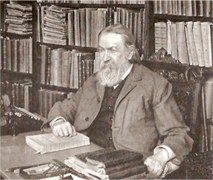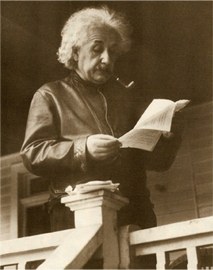Philosophy
Texts by Dr. Antonio Moreno González
Einstein considered that his scientific work formed part of the philosophical contributions made throughout history to understanding the mysteries of nature. In a book written by Einstein and his assistant Leopold Infeld ( The Evolution of Physics, from Early Concepts to Relativity and Quanta (New York, 1938)), speaking about the reciprocity between physics and philosophy, in the section "The philosophical background", he wrote:
"The findings of scientific research often determine profound changes in the philosophical conception of problems whose breadth escapes the restricted domain of science. What is the purpose of science? What requirements must by met by a theory that seeks to describe nature? These questions, even when they exceed the remit of physics, are closely associated with it, since they have their origin in science. Philosophic generalisations must be based on scientific conclusions. But, when the former are broadly established and accepted, they in turn influence the subsequent development of scientific thought, indicating one of the many paths to be taken. One consequence of a fortunate rebellion against that which accepted is that it leads to generally unexpected developments which bring with them new philosophical conceptions. These observations will appear vague and insubstantial if they are not illustrated by examples from the history of physics."
However, like everything else in his life, Einstein's attitude to knowledge was peculiar, and not without its contradictions. Whereas at the beginning of his career he was influenced by positivist philosophers such as Ernst Mach and the mathematician Poincaré, in his later years he abandoned positivism, even going so far as to call Mach as "a bad philosopher", increasingly convinced as he was that the formulation of scientific theories did not need to be associated with the experience of observation. From his encounters with Einstein, Karl Popper reached this conclusion: "It is our inventiveness, our imagination, our intellect and especially the use of our critical faculties to argue and compare our theories which makes it possible for our knowledge to be developed". Einstein summarised this notion in a few words: "Here there is no goal, only the opportunity to give oneself over to the pleasant task of thinking". Speaking of his personal impression of Einstein, Popper wrote:
"It is difficult to convey the impression that Einstein's personality made on me and on my wife. One simply had to trust him, one had to surrender unconditionally to his kindness, his goodness, his wisdom, to his sincerity and his almost childlike simplicity. It says a lot in favour of our world and in favour of America that a man who is so distant from the world not only can survive in it, but that he is appreciated and respected in it."
As regards to his way of working and acting, some notion can be gleaned from the conversations with Einstein's son, Hans Albert, and a large group of Einstein's collaborators from throughout his life, broadcast by the BBC in 1966, and published by G. J. Whitrow in Einstein: The Man And His Achievement (Mexico, 1961). These are some of the ideas taken from Banesh Hoffmann's piece on the period from 1937 when he and Leopold Infeld worked under Einstein's supervision, having dared to introduce themselves to the great scientist and ask him to advise them on a subject for research:
"I had the good fortune to work with Einstein. Anyone would have seen it as a wonderful opportunity to see how his mind worked and learn how to become a great scientist oneself. Unfortunately, those revelations did not occur. Genius cannot be reduced to a series of simple rules that anyone can follows.
When we reached an impasse, we would all pause and Einstein would stand up quietly and say in his quaint English "I will a little think" So saying, he would pace up and down and walk around in circles, all the time twirling a lock of his long grey hair around his forefinger. At those dramatic moments, Infeld and I would stay completely quiet, not daring to move or make the least sound, so as not to interrupt the course of his thought... He had a dreamy, distant and yet inward-looking look on his face. He did not have an appearance of intense concentration. A minute would pass, and then another and suddenly, Einstein would visibly relax and his countenance would light up with a smile... he seemed to return to reality and become aware of our presence again. Then he would give us the solution to the problem and the solution nearly always worked."

Ernst Mach (1838 - 1916)

Going over some ideas
